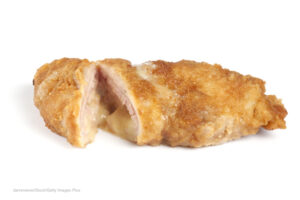The USDA announced plans this week to make it illegal to sell chicken Kiev and other stuffed, breaded, raw chicken products that are contaminated with Salmonella. Declaring Salmonella an “adulterant” in this subset of the vast array of poultry products available to American consumers is a small step forward in the agency’s stated goal of remaking its strategy for controlling Salmonella in poultry.
But it made big news.
Chair of the House Appropriations Committee Rosa DeLauro (CT-03), who is perhaps the greatest champion of food safety in Congress, released a statement calling the announcement a “vital first step to improved protections for the public from foodborne illness.”
The Centers for Science in the Public Interest, which along with other consumer groups, petitioned the USDA in January 2021 to create enforceable standards for poultry products, called the “long-awaited” announcement “a bold step.”
And polls show overwhelming consumer support for stricter poultry regulations.
The National Chicken Council (NCC), a trade group that represents the chicken industry, however, did not share the enthusiasm consumers and food safety advocates showed for the announcement.

“NCC is concerned about the precedent set by this abrupt shift in longstanding policy, made without supporting data, for a product category that has only been associated with one outbreak since 2015. It has the potential to shutter processing plants, cost jobs, and take safe food and convenient products off shelves. We’re equally concerned that this announcement was not science-based or data-driven,” Ashley Peterson, Ph.D., senior vice president of scientific and regulatory affairs said in a statement.
There have actually been two Salmonella outbreaks linked to these products since 2015, not one as Peterson stated. A 2021 outbreak linked to products made by Serenade Foods sickened 36 people, and a 2018 outbreak linked to Ruby’s Pantry Pop-Up locations sickened four people.
And choosing 2015, a year when there were two Salmonella outbreaks linked to stuffed, breaded chicken products, is an odd choice. On one hand, Peterson seems to choose that year as if to say (incorrectly) “things have improved, there hasn’t been an outbreak since 2015.” On the other hand, she says NCC made labeling suggestions to the USDA that year to improve food safety but received no response from the agency. (One reason for this may be that the USDA already made these changes in 2008.)
Peterson goes on to say, “Even though Salmonella was not considered an adulterant in these products, the industry has treated their safety as a top priority for more than a decade.”
In 2015, Aspen Foods, one of the companies linked to one of the outbreaks that year, refused to issue a recall even after inspectors found what they described as a “systemic” Salmonella problem at the Chicago plant where the products were made. Eventually, USDA issued a public health alert and directed its personnel to detain all products covered by the alert found in commerce.
Last summer, Serenade Foods also declined to issue a recall after being informed by the Minnesota Department of Agriculture in June 2021 of test results showing the Salmonella outbreak strain had been found in two samples of Kirkwood’s Chicken Cordon Bleu.
Because Salmonella is not considered an adulterant in raw chicken products, the USDA will not ask a company to issue a recall until it finds the outbreak strain in unopened intact packages of poultry purchased by an outbreak patient. By the time they were able to do that last summer, two months after the Minnesota testing had been done, the outbreak had doubled in size causing 36 illnesses and 12 hospitalizations. Serenade issued a recall on August 10, 2021.
These preventable illnesses are no doubt part of the data that informed the USDA’s decision to take this small step.
As DeLauro said, “With nearly 1.35 million Americans getting sick from Salmonella every year, and about one-fifth of those cases stemming from chicken or turkey, we must ensure food manufacturers are held to the highest safety standards. When a similar action was taken on E. coli, its prevalence decreased immensely, and I hope to see a similar result once this proposal is finalized. I commend Secretary Vilsack and Deputy Undersecretary Eskin for their work and I look forward to working together on introducing additional measures to reduce Salmonella contamination in all poultry products.”

I.




